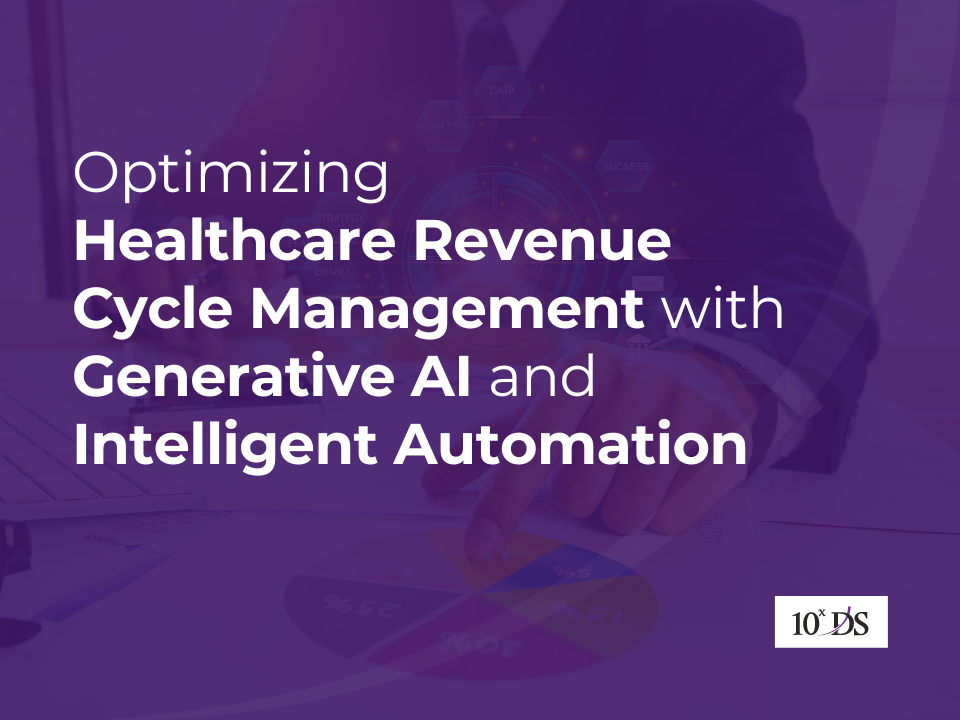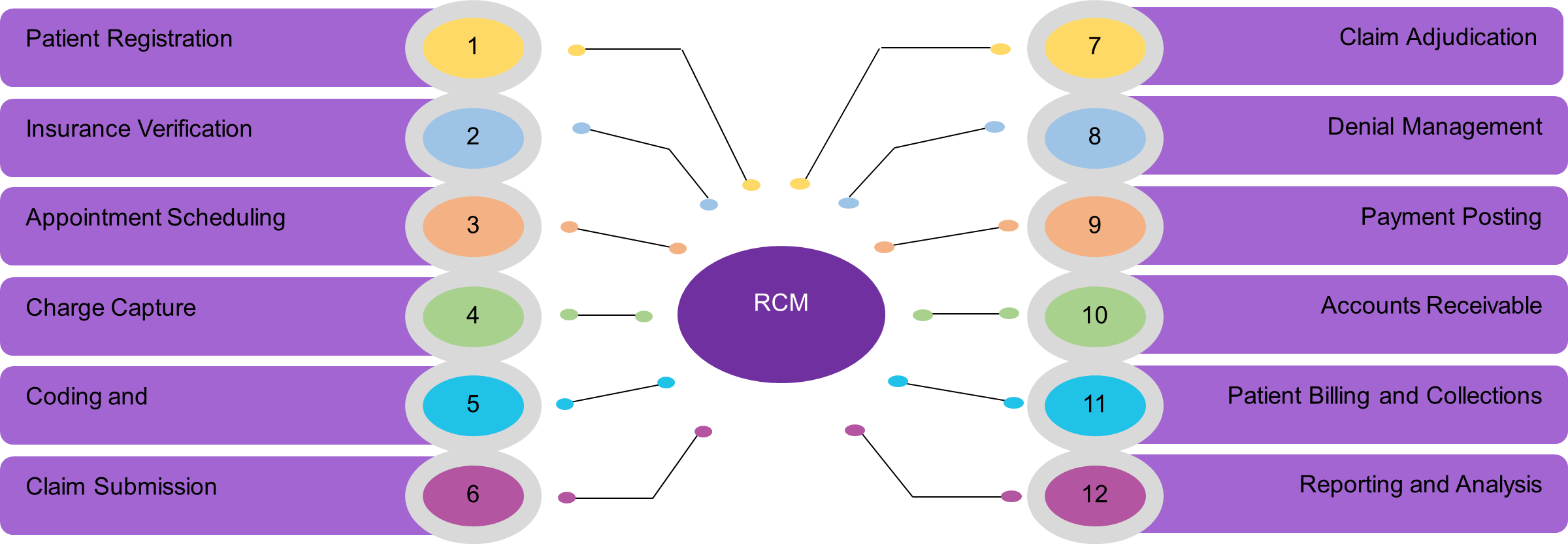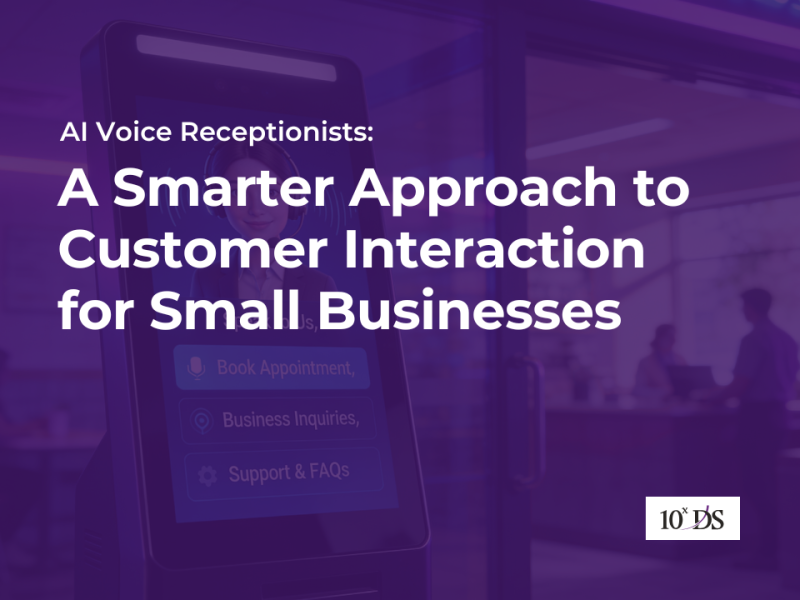
Optimizing Healthcare Revenue Cycle Management with Generative AI and Intelligent Automation
Revenue Cycle Management (RCM) serves as the financial backbone of healthcare organizations, ensuring the smooth and efficient flow of revenue from patient encounters to reimbursement. In today’s complex healthcare landscape, characterized by evolving regulations, shifting payment models, and increasing patient financial responsibility, effective RCM has become more crucial than ever. By optimizing processes related to patient registration, insurance verification, coding, billing, and collections, RCM not only maximizes revenue but also enhances operational efficiency, mitigates compliance risks, and improves the overall financial health of healthcare providers. In essence, RCM is indispensable for healthcare organizations striving to achieve sustainable growth, deliver high-quality care, and maintain financial stability in an increasingly competitive environment.
Some common challenges faced by practices in managing their revenue cycle are:
- Collecting payments promptly after providing treatments to patients is of utmost importance. Revenue not flowing consistently into the practice can adversely affect overall operations and efficiency.
- Balancing patient care with revenue cycle optimization is essential. Practices often lack the necessary tools and resources to efficiently manage their revenue cycle.
- Obtaining pre-authorization before providing care or treatment is necessary but time-consuming. Delays and errors in this process can further cause inconvenience to patients.
- Compliance with industry rules and regulations like the Healthcare Information Portability and Accountability Act (HIPAA) is critical, especially when outsourcing RCM services.
- Interoperability gaps between systems can hinder efficient revenue cycle processes.
- Accurate medical coding is essential for billing and reimbursement. Errors in coding can lead to revenue loss.
- Practices often lack a comprehensive understanding of their revenue cycle. Gaining deeper insights can help identify areas for improvement and enhance overall financial management.
RCM takes into consideration all the financial aspects of healthcare services, from patient registration and appointment scheduling to billing and collection of payments. The main processes involved in Revenue Cycle Management are represented in the illustration below.
 AI in revenue cycle management can help healthcare organizations optimize their revenue cycle, improve cash flow, reduce billing errors, and enhance overall financial performance. Together, intelligent automation and Generative AI empower businesses to reimagine processes, empower employees, and deliver exceptional value to customers in an increasingly digital world. By integrating advanced technologies like machine learning, natural language processing, and robotic process automation, organizations can unlock unprecedented opportunities to streamline operations, augment decision-making, and drive sustainable growth. Generative AI, with its ability to understand context, generate human-like responses, and even create novel content autonomously, adds a layer of creativity and adaptability to automation solutions. According to the results of a new Everest Group report, supported by Omega Healthcare, an overwhelming majority (85%) of senior healthcare executives surveyed believe AI in revenue cycle management (RCM) operations will improve efficiencies over the next five years.
AI in revenue cycle management can help healthcare organizations optimize their revenue cycle, improve cash flow, reduce billing errors, and enhance overall financial performance. Together, intelligent automation and Generative AI empower businesses to reimagine processes, empower employees, and deliver exceptional value to customers in an increasingly digital world. By integrating advanced technologies like machine learning, natural language processing, and robotic process automation, organizations can unlock unprecedented opportunities to streamline operations, augment decision-making, and drive sustainable growth. Generative AI, with its ability to understand context, generate human-like responses, and even create novel content autonomously, adds a layer of creativity and adaptability to automation solutions. According to the results of a new Everest Group report, supported by Omega Healthcare, an overwhelming majority (85%) of senior healthcare executives surveyed believe AI in revenue cycle management (RCM) operations will improve efficiencies over the next five years.
Use case of RCM process optimization using Intelligent automation and Generative AI
By leveraging automation and AI technologies like Gen AI in revenue cycle management process of patient registration, let us see how healthcare organizations can streamline operations, improve data accuracy, enhance patient satisfaction, and ultimately deliver better quality care.
Online Pre-Registration
Implement a user-friendly online portal where patients can pre-register before their appointment. Gen AI can assist in creating intuitive forms that adapt to individual patient needs, guiding them through the registration process smoothly.
Multilingual Registration Assistance
Use Gen AI to support real-time multilingual translation and communication during the registration process, improving accessibility and patient experience.
Automated Data Entry
Utilize Optical Character Recognition (OCR) technology and Gen AI to automatically extract relevant information from scanned documents, such as insurance cards and driver’s licenses, reducing manual data entry errors and saving time.
Intelligent Form Completion
Employ Gen AI to dynamically populate registration forms with existing patient data from electronic health records (EHRs), minimizing redundant data entry for returning patients and ensuring accuracy.
Real-time Insurance Verification
Integrate AI-powered tools to verify patient insurance coverage in real-time, identifying any eligibility issues or discrepancies before the patient’s appointment.
Predictive Analytics for Appointment Scheduling
Utilize predictive analytics and Gen AI algorithms to optimize appointment scheduling based on historical data, patient preferences, and provider availability, reducing wait times and maximizing clinic efficiency.
Chatbots for Assistance
Implement AI-powered chatbots on your website or mobile app to assist patients with registration queries, provide information about required documents, and guide them through the registration process step by step.
Emotion & Sentiment Analysis during Interaction
Analyze patient sentiment during chatbot interactions to detect frustration or confusion and escalate to a human when needed.
Biometric Identification
Use biometric authentication technologies, such as facial recognition or fingerprint scanning, to securely verify patient identity during registration, minimizing the risk of identity theft and fraud.
Automated Reminders and Follow-ups
Implement automated reminder systems powered by AI to send appointment reminders, collect missing information, and follow up with patients regarding incomplete registrations or outstanding requirements.
Natural Language Processing (NLP) for Documentation
Employ NLP algorithms to extract relevant information from free-text fields on registration forms, such as medical history or reason for visit, and automatically populate structured data fields in EHRs.
Continuous Improvement with Machine Learning
Utilize machine learning algorithms to analyze registration data over time, identify patterns, and continuously improve the registration process based on feedback and performance metrics.
While this only a single process of RCM, technology can be employed to optimize all the process. The future of Revenue Cycle Management (RCM) holds immense promise with the integration of intelligent automation and Generative AI. This convergence is set to revolutionize RCM processes by enhancing accuracy, efficiency, and adaptability while minimizing errors and manual intervention. Intelligent automation, powered by machine learning algorithms and robotic process automation (RPA), will automate routine tasks such as data entry, claims processing, and billing, enabling RCM teams to focus on more strategic initiatives. Additionally, Generative AI’s capability to generate human-like responses and insights will augment decision-making processes, providing RCM professionals with actionable intelligence to optimize revenue capture and minimize revenue leakage. Moreover, as these technologies continue to evolve, we can expect further innovations such as predictive analytics for revenue forecasting, personalized patient engagement strategies, and dynamic pricing models tailored to individual payer preferences. Ultimately, the future of RCM with intelligent automation and Generative AI holds the promise of a more efficient, agile, and patient-centric revenue cycle ecosystem, driving improved financial outcomes and enhanced patient experiences for healthcare organizations worldwide.
We, at 10xDS, have streamlined the revenue cycle management process as well as help forecast revenue for a leading Healthcare Group in Middle East. The solution offers key insights and trends for improved decision-making and visibility into the revenue cycle. It enhances revenue forecasting accuracy and tracks critical KPIs such as charge lag, first pass ratio, time to dispatch, redispatch ratio, payer-wise Pareto analysis, clinic/procedure contribution, physician revenue, and projections.
Talk to our experts to learn more about Automation and AI services.


